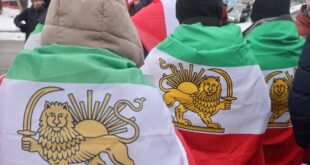TEHRAN (AP) — UN Secretary General Kofi Annan on Monday urged more talks to resolve Iran’s nuclear standoff with the West even as Tehran’s hardline leadership said it was pleased with his visit and recent European overtures and accused the United States of sabotaging diplomatic efforts.
On the heels of his difficult visit to Tehran, Annan said the UN Security Council was trying to avoid a confrontation “which will not be in Iran’s favour or that of the region.†“The best solution to the issue is talks,†Annan was quoted as saying by the official Qatar News Agency, while on a stop in Doha, Qatar, after the Iran visit. He flew later Monday to Saudi Arabia.
The United States and its allies are applying growing pressure for punitive action against a defiant Iran, but there is little consensus in Europe on the need.
Annan’s two-day visit to Tehran came after Iran ignored the UN Security Council’s Thursday deadline for Tehran to halt uranium enrichment, opening the door to possible sanctions over concerns that the Iranians are trying to develop atomic weapons.
Annan on Sunday met Iran’s President Mahmoud Ahmadinejad, who told him that Iran favoured talks over its nuclear programme but would not halt uranium enrichment before entering negotiations as demanded by the West.
Iran’s unyielding stance appears to be based on the calculation that Russia and China, both veto-wielding Security Council members who have major commercial ties with Iran, will oppose sanctions.
The oil-rich nation insists the programme is peaceful, intended only to produce fuel for nuclear reactors that generate electricity. On Monday, the Iranian government insisted that a hostile US attitude was to blame for the impasse.
“There is a good trend over the nuclear issue,†Elham said. But he added: “Some countries and powers like the US want to turn the logical trend into an illogical one.†The European Union is mounting a last-ditch effort to diffuse the dispute with Iran, which hid its nuclear activities for 18 years, and has held out the possibility of more talks. The European Union’s foreign policy chief and Iran’s top nuclear negotiator plan to meet later this week.
But German Foreign Minister Frank-Walter Steinmeier said Monday he was sceptical about the chances for success after Annan’s failure to secure any commitment to halt uranium enrichment from Iran’s leaders during his visit, which ended Sunday.
“We must remain sceptical that this will work,†Steinmeier said at a meeting of Germany’s foreign ambassadors. “If not, the road to the UN Security Council will be unavoidable.†Iranian government Spokesman Gholam Hossein Elham on Monday described the UN chief’s visit as “good, suitable and positive.†“In the nuclear field, the discussions were fair,†Elham said. “Both sides supported negotiations for achieving a solution.†In June, the five permanent members of the Security Council plus Germany offered Iran a package of economic and diplomatic incentives to limit its nuclear programme.
Iran didn’t respond until August 22, rejecting the condition that it stop enriching uranium before talks. The content of its response has not been made public.
Iran’s slowness in responding to the incentives package prompted the Security Council to issue a resolution July 31 ordering it to halt uranium enrichment by the end of August.
Iran also said Monday that it had tested a new air defence system to counter missiles and aircraft during large-scale military exercises throughout the country, state-run television reported.
The television footage showed at least four surface-to-air missiles being fired from mobile launching pads. The report did not say if the missile was equipped with a guidance system.
Iran’s military test-fired a series of missiles during large-scale war games in the Persian Gulf in March and April, including a missile it claimed was not detectable by radar that can use multiple warheads to hit several targets simultaneously.
 Eurasia Press & News
Eurasia Press & News



